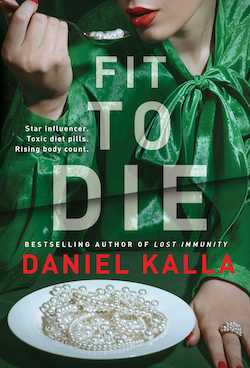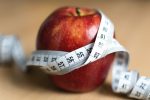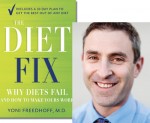“I see how it looks…. Just another teen suicide. Or maybe an accidental OD. Another addict who fooled his parents. No…! I know my Owen…. Never, never, never….”
 This is the reaction of Owen’s mother – who happens to be a U.S. senator – to her son’s death in Daniel Kalla’s latest thriller Fit to Die (Simon & Schuster Canada). L.A. detective Cari Garcia initially writes off the reaction as a mother ignorant of her child’s drug use, and bristles against the political pressure to determine the young track star’s cause of death. When she learns he died from ingesting a capsule that contained 2,4-Dinitrophenol, or DNP – used as a fertilizer, pesticide or explosive, but also abused by people to lose weight – she becomes more motivated to solve the mystery, in part because of a tragedy in her own past.
This is the reaction of Owen’s mother – who happens to be a U.S. senator – to her son’s death in Daniel Kalla’s latest thriller Fit to Die (Simon & Schuster Canada). L.A. detective Cari Garcia initially writes off the reaction as a mother ignorant of her child’s drug use, and bristles against the political pressure to determine the young track star’s cause of death. When she learns he died from ingesting a capsule that contained 2,4-Dinitrophenol, or DNP – used as a fertilizer, pesticide or explosive, but also abused by people to lose weight – she becomes more motivated to solve the mystery, in part because of a tragedy in her own past.
Meanwhile, here in Vancouver, toxicologist Dr. Julie Rees is dealing with a mysterious increase in deaths among bodybuilders, finding out that DNP is the cause. Then, a famous pop star and social media influencer dies in her penthouse, showing the same symptoms. And the co-owner of a wellness centre with locations in Los Angeles and Vancouver dies of a similar overdose. All the cases are connected and the L.A. and Vancouver police and medical personnel have to work together to find out who’s behind the influx of DNP on the market.
Like all of Kalla’s books, Fit To Die is an intriguing read, suspensefully written. While I didn’t enjoy it quite as much as I have his other thrillers – it was somewhat repetitive and the main characters’ backstories didn’t ring as true to me – I still wanted to know whodunnit. I also value having learned about the real-life issue of toxic diet pills and gaining some insight into body dysmorphia and eating disorders. I trust Kalla’s facts, as he is not only a writer, but an emergency room physician and a University of British Columbia clinical associate professor. He was kind enough to answer some questions via email.
JI: There are some Jewish-sounding surnames in the novel. In what ways does your being Jewish enter into your novel writing?
DK: Well, in this case the Hertzberg-Davis Centre is the real forensic lab for the LAPD. So that made it easy. I couldn’t remove the Jewish influence in my writing even if wanted to, which, obviously, I don’t. I’ve written a historical trilogy, The Far Side of the Sky, that is explicitly a Jewish story. In thrillers like Fit to Die, I don’t consciously think about my background or religion, but there is no doubt it influences the writing.
JI: Do you name characters after friends, or sometimes offer naming opportunities for charity auctions or the like?
DK: Haha. I learned early in my writing career to never name a character after a friend. It only ends badly. I’ve never auctioned off a character name for charity, but I would love to. It can be agony finding the right character name. Why not outsource it?
JI: This is your 10th thriller. How has your writing style and/or process evolved since your first one?
DK: I hope I’ve learned from some of my past mistakes. Paradoxically, it gets easier and harder. Easier in the sense that I’m more confident in my voice and the nuts and bolts of my storytelling. Harder in that I’m more critical of my writing and fear becoming derivative in my stories. But the one thing that keeps me going is my enthusiasm for telling a new story. I think I’m more passionate than ever.
JI: From the several thrillers of yours that I’ve read, your topic choices are timely and coincide with current events. The medical side, you’ve got covered. But what are some of your sources for other aspects? In this book, for example, how the dark web works and even the pop culture aspects, including language, like “partizzle”?
DK: I obviously have a huge advantage with respect to the medical background, but that’s only a part of it. As you point out, this story – about a (real) and deadly diet pill that is marketed online to the most vulnerable and amplified by toxic social media – took some intense research. I had to learn all about body dysmorphia and immerse myself in the TikTok culture, which explains some of the Zoomer slang one of the character uses, like “partizzle.” I was lucky to have a local VPD superintendent help guide me through the logistics of what an investigation into this kind of complex online conspiracy would look like.
JI: Where do you find time to write?
DK: For me, it’s never about the time. I’m lucky to work in the ER, which is shift work, but I think I could find time no matter what my day job was. For me, it’s all about momentum and inspiration. When I have those, I find the time. When I don’t, free time doesn’t help.
JI: What part of your soul does writing feed?
DK: Not to sound overly melodramatic, but it kind of feeds my core. Medicine does, as well, but in a very different sense. I find purpose as a doctor, but I find my passion as a writer. I can imagine retiring one day from medicine, but I can’t imagine not writing.
JI: Can you speak about the process of getting a book from idea to publication?
DK: The challenge of transforming the kernel of an idea into a publishable novel always seems insurmountable from the outset – this book particularly. I wanted to build a compelling mystery and resurrect some characters from a past novel (The Last High) and introduce new ones, all while tackling a highly sensitive yet vitally relevant topic: how the toxic diet culture and social media prey on the most vulnerable. I like to think I met the challenge, but, of course, that’s for each reader to decide.


